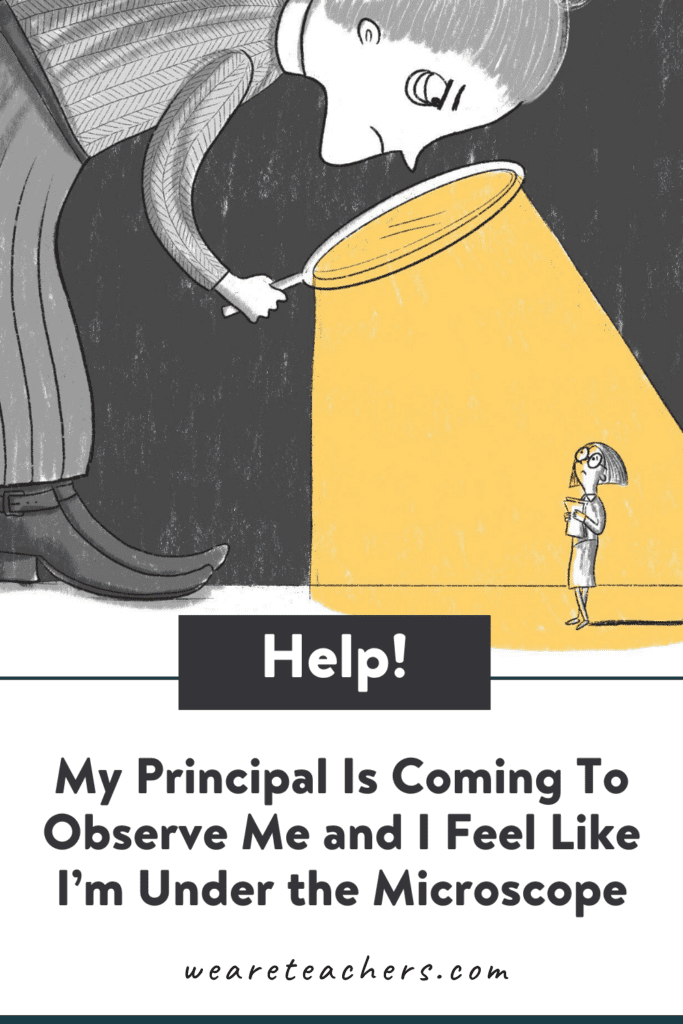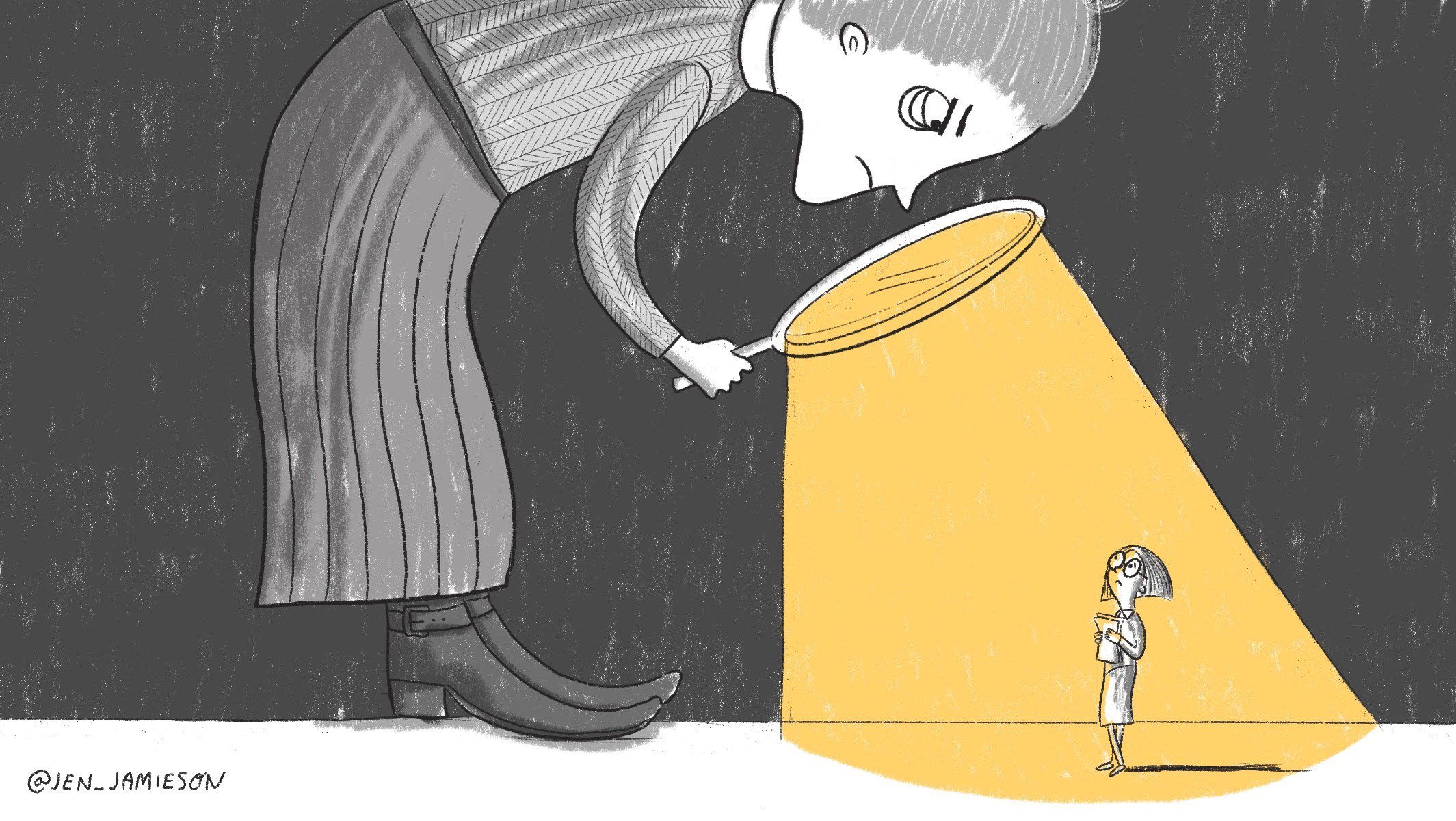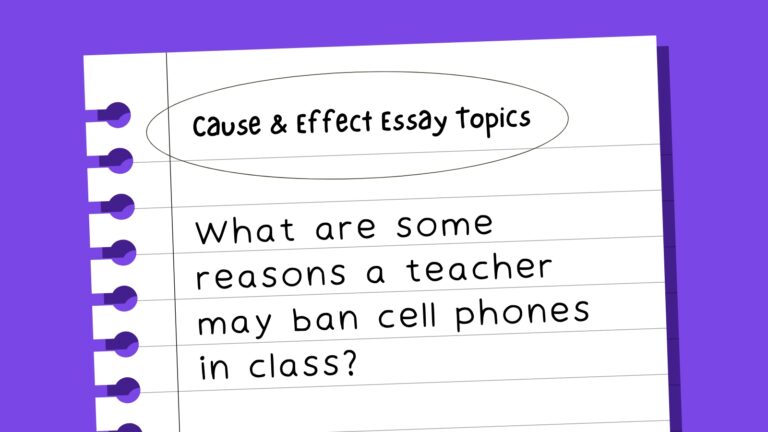Dear WeAreTeachers:
My department coordinator is observing me next week. She sent me so many questions to respond to, and they are due along with my lesson plan with a very short turnaround. How does this further student learning? How does stressing out teachers help my students? I seriously want an answer to that. It just seems like busy work and a further narrowing of the curriculum. It’s so nerve-wracking to be observed, and even though I explain what’s going on with the students beforehand, things always seem to be bumpy. I’m dreading this. What tips do you have to help me endure this torture? —Under the Microscope
Dear U.T.M.,
There is no doubt that classroom observation can cause stress and leave a teacher feeling exposed. So many of us relate to those wobbly, uneasy, frustrating, and uncertain feelings that emerge with vulnerability. Even as I write, my heart races a bit knowing observations are snapshots and not the whole photo album of teaching and learning. And the additional workload of responding to the questions and preparing formal lessons with very little time adds to the overwhelm.
If your feelings of anxiety are flaring up and making it hard to focus, give these coping ideas a try. Take big, long, slow breaths to signal your body that you are OK. Follow a full inhale and exhale. Stay focused on your students and keep eye contact with them. You can welcome your guests but immediately get back in the moment with your students. Wear clothes that are comfortable to you so that you don’t have other distractors. And remember, the observation won’t last forever.
My sense is that there is emerging trust with your principal. When there is an authentically trusting relationship between educators and administrators, teachers’ voices are legitimately invited in, and educators feel like there is room for risk-taking and mistakes. Morale weakens when teachers don’t feel supported.
Kathy Melanese, a principal in the National School District in Southern California, is a leader who prioritizes open and ongoing communication. She says, “Everyone feels under the microscope when being observed… It means you care about your craft and want to have an impact on your students.” When Principal Melanese works with the educators at her site, they discuss how planning and instructional choices are leading to student learning.
Yes, observations are part of the education system we work in. Consider asking your leadership for pre-brief and debrief time to connect in a meaningful way. Hopefully, being able to talk about your lesson will make the experience less nerve-wracking because you can provide classroom context and ways you are being responsive to your students’ needs. Getting observed and debriefing has the potential to promote reflection to help us stretch as grow as professionals and, in turn, positively impact learning conditions in the classroom. Asking for rubrics and evaluation tools prior to the observation helps gain more clarity of purpose.
Even though the reflection questions can feel like overkill sometimes, responding to questions in writing can bring clarity of thought. Writing fosters understanding and has the potential to help uncover and untangle thought patterns and feelings. When we write, we are given the opportunity to nurture our self-awareness, which seeps into our personal and professional growth.
Instead of feeling studied “under the microscope,” take moments in the process to pause and reframe the observation as an opportunity to look closely into the microscope to see your own patterns of practice and hold on to what is most effective.
Dear WeAreTeachers:
I was involved in breaking up a brutal fight among five students (16-18 years old). When I tried to separate two, I got caught between them, dragged back, and pinned against a wall. I caught blows to the head, face, and body. No broken bones for me, but two black eyes, bruises, and an everywhere-sore body. I tried to go in to work yesterday but only made it 20 minutes. Those students are being expelled, so I know there is no threat, but my brain just went into panic mode. My principal has been great and told me to take all the time I need. I stayed home today to work on regrouping mentally and physically. I WANT to be at work, but I just start to panic every time I think about it. What advice do you have to help me move past this? —Pinned to the Wall
Dear P.T.T.W.,
What a tragic nightmare! Please accept the outpouring of healing energy coming from the WeAreTeachers community of educators. When you experience emotional and physical trauma as you have, it’s important to get professional support. Rest assured, there is no shame in seeking out counseling services.
Your school district should be able to provide immediate support through the Employee Assistance Program to help you manage the panic attacks and anxious feelings that are being triggered when you feel the pain from the attack or step foot on campus. You are experiencing intense, raw moments right now, so take the time you need to heal on the inside and outside. What a relief that your principal is being supportive to you and can help you navigate the turmoiled terrain to attain the help you need and deserve.
Although not everyone who experiences an attack and trauma is diagnosed with post-traumatic stress disorder, some are. PTSD is a real thing. And the human brain needs retraining to cope after a serious injury and assault as you experienced at the hands of your students. Many victims wonder how to put one foot in front of the other, and there are ways to manage distress after a violent attack. A couple of tips include listening to your body and allowing any and all feelings to come up. Also, focusing on the things that you DO have control over versus what’s out of your sphere of control is impactful.
It sounds like you feel relieved that the students were expelled. It would be extra challenging to face the students who hurt you in person. Schools all over the nation are dealing with how to respond to the extreme behavior issues that are popping up. Are we heading in the right direction by hiring more police offers instead of counselors? Almost 60 percent of schools employ armed guards, and 90 percent of the guards carry guns. Or will the restorative practices turn around schools and help get to the root of the conflicts and violence that occur on campuses?
Restorative justice is a theory of justice that emphasizes repairing the harm caused by criminal behavior. It is best accomplished through cooperative processes that include students, educators, and other stakeholders. When consistently implemented, this approach can lead to the transformation of people, relationships, and communities.
One of my favorite fountains of inspiration is American poet Maggie Smith. She wraps words around the way forward: “Accept the fact that some days burn, and you have to live them to get beyond them. There’s no way to the other side but through. Go through. Walk the hot coals but don’t look down at your feet. Look ahead. Keep moving.”
DearWeAreTeachers:
I have 20 years of experience as a teacher, and I am really struggling. I teach five different high school lab-based classes this term. It is killing me. There is no curriculum for any of these classes. I’ve sent more kids to the office this year than in the last 19 years total. I’m angry and have tension headaches almost every day. I feel unappreciated, under-supported, and not myself. How can I shift from surviving to thriving again? —Bound for Burnout
Dear B.F.B.,
As an experienced teacher, I’m sure you have built up strategic, efficient, and effective ways to plan. You also have faced a multitude of behavioral issues throughout the years. So, what’s different now? Well, here we are wrought with major turmoil on our campuses all over the world because of the pandemic. There are big interruptions with student attendance due to quarantines. The many pandemic protocols teachers have to follow for safety reasons can weigh heavy. That’s a lot of responsibility.
One major cause of the throbbing stress at sites is the trickle-down effect of staffing shortages. Administrators are spending a lot of time covering classrooms, and teachers are feeling like they have tried everything to minimize disruptive behaviors. Additionally, most grade-level teams are discussing ways to address the wide range of student competencies. Because of the deep need for differentiation, teachers’ workload has increased while simultaneously there are fewer people to support. The conditions we are working under impact our sense of self-efficacy. The American Psychological Association states, “Self-efficacy reflects confidence in the ability to exert control over one’s own motivation, behavior, and social environment.”
Doris Santoro, author of the book Demoralized, says, “Most all teachers have moral reasons for getting into the profession. But systemic pressures, such as top-down initiatives or punitive evaluation systems, can deplete teacher autonomy. As a result, teachers may feel they can no longer tap into what ‘makes their work morally good.’ They can start to feel frustrated or ashamed of the work they’re doing.” Remember “your why gives your what more impact.”
When I read your words and imagine the unspoken ideas, I notice that you are not feeling valued or supported. And even though you are grateful for your students, pausing and appreciating things that bring you some ease and nourishment is important. Have you ever considered taking a sabbatical? Or taking a few minutes each day to jot something that you did that had a positive impact on your students? We need to glorify rest and not only work.
Dear WeAreTeachers:
I’ve been teaching 9th grade English for over 10 years. More and more, parents are overly involved with their students’ grades. Recently, I had a student in my class request a formal meeting with me, her mother, and the assistant principal. She received an 89 percent on an essay, and she and her mother were both in tears, demanding that I be reprimanded and re-trained for “unfair grading policies.” I talked about how the essay was graded, but the parent just kept saying it was unfair. My vice principal was diplomatic, but I didn’t feel supported during or after the meeting. Grading is one aspect of my job that is really hard, and feeling unsupported and attacked was awful. I don’t think parents are doing their kids any favors by intimidating teachers to get grades raised. Should I change the grade? —You Can’t Always Get What You Want
Dear Y.C.A.G.W.Y.W.,
I’m sure enduring the conference with the student, parent, and assistant principal triggered some intense emotions for you. I know that I would have felt somewhat defensive. I can imagine you shaping the conversation around how mistakes are opportunities for growth and engaging the student in self-reflection and goal-setting as a powerful path to self-efficacy and empowerment. I’m sure you shared your rationale for the grade, and it sounds like your administrator avoided conflict, and the parent was pushy. My wondering is how does this affect the student.
I have years and years of personal experiences with how grades deeply and negatively affected my daughter’s entire school-age life. I’m even going to go as far as to say that she based her self-worth on grades and honestly felt like a “B was bad.” I never outwardly or knowingly pressured her to perform as a “straight A” student. I didn’t emphasize report cards, and I never gave extrinsic rewards for “good grades.” But this is how life unfolded for her. My daughter’s obsession with grades exacerbated her anxiety and depression. Unfortunately, her efforts to maintain a 4.0 G.P.A. or higher compromised her well-being big time.
I don’t think many people enter the teaching profession because they love grading. And yet, here we are with a big emphasis on grades. The concept of grade obsession is widespread among parents and students. Many students think that anything less than an “A” is awful. Maintaining straight As is a form of perfectionism. Psychology Today describes perfectionism as “a trait that makes life an endless report card on accomplishments or looks. When healthy, it can be self-motivating and drive you to overcome adversity and achieve success. When unhealthy, it can be a fast and enduring track to unhappiness.”
As far as your question about changing the student’s grade, I would encourage you to focus on the bigger picture and communicate overall grades with the student and parent. Try shifting the focus from a single assignment to a body of learning. One essay does not represent the student’s learning journey. Also, you might want to consider offering the whole class opportunities for extra credit. This level of support always made my daughter feel a little less stressed. Providing extra credit might be a compromise you are willing to make in order to deescalate the intense focus on grades.
It’s hard to escape grades, but we can focus on learning, progress over time, meaningful feedback, reflection, and goal setting with our students. Even having student-led conferences can shift the focus to student empowerment. When you have a few moments, it’s worth requesting a counselor to do a one-on-one check-in on the student to see how they feel about their grades. It might just open the door and save a student a lot of pain.
Do you have a burning question? Email us at askweareteachers@weareteachers.com.
Dear WeAreTeachers:
Birthdays in my kindergarten are getting out of control. One mom recently asked to bring cupcakes and pizza. She and her boyfriend wanted to attend and asked for an hour to be set aside. I explained that we have a learning schedule, and we do birthdays at 10:15 snack time. She showed up at 10:40. With an entire cake and 25 juice boxes. And that’s it. No plates, forks, or napkins. I asked the family if they wanted to cut and serve the cake, and they looked at me with blank stares. So I cut and served 25 pieces of birthday cake and juice boxes and initiated the birthday song. I was fuming. Not to mention, I had 25 kindergarteners hopped up on sugar for the rest of the day. How do I avoid putting myself in that situation again?
Illustration: Jennifer Jamieson


